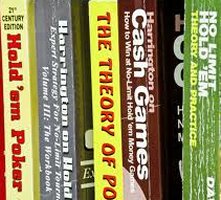We All Started Somewhere: Tips for Beginning Poker Players

 Even players who are naturals at poker had a steep learning curve early on in their careers. The growth and improvement that can be experienced in the first few months of serious play is tremendous for players who dedicate themselves to improving and have some natural ability for strategy, mathematics, and psychology.
Even players who are naturals at poker had a steep learning curve early on in their careers. The growth and improvement that can be experienced in the first few months of serious play is tremendous for players who dedicate themselves to improving and have some natural ability for strategy, mathematics, and psychology.
While we all have to make, and learn from, our mistakes, there is no harm in doing what we can to streamline and expedite the learning process while minimizing the bumps along the way.
Poker strategy is endless and constantly changing, but there are many areas that stay constant. The thoughts below are just a few things that come to mind when I think about what suggestions and advice I have given to people who have asked me for help early on in their poker careers. A lot of the time, my advice varies greatly from individual to individual depending on my knowledge of their life situation, tendencies, and expectations for the game.
One of the most common things I have found myself telling the younger crowd that asks me about getting into poker is that they need to do it for the right reasons. Poker is a fun, stimulating, and challenging game with great social aspects and networking opportunities, but many of the younger individuals asking me about it were really just looking for a cop-out to avoid getting their lives on track as they came into being adults.
There is nothing wrong with playing poker and nothing wrong with doing it for a living, but playing poker for a living should not be a goal when you are first learning and experiencing the game. Play for fun first. Play hard and try to improve as quickly as you can, but don’t expect to go from being a novice to living the glamorous life as a professional player right away.
If you are smart enough, talented enough, and dedicated enough, then put those same skills into other aspects of your life instead of just focusing on poker early on.
 Playing for fun allows you the time to grow and learn without added pressure and stress. You can play poker for play money all you want, but the game doesn’t become real until cold hard cash is on the line. The amounts don’t have to be huge and everyone should play within their comfort level, but having real money on the line is a key element to making poker the complex and exciting game it is.
Playing for fun allows you the time to grow and learn without added pressure and stress. You can play poker for play money all you want, but the game doesn’t become real until cold hard cash is on the line. The amounts don’t have to be huge and everyone should play within their comfort level, but having real money on the line is a key element to making poker the complex and exciting game it is.
When you first start playing, be prepared to lose. Don’t expect to lose, but be prepared to handle it both emotionally and financially. Winning at poker is difficult, but the best way to learn and improve is to play, get time in at the tables, and be able to handle losses along the way.
If you are playing for fun within limits you can handle, then losing should not be a financial issue as much as a competitive one. When I first started playing, our game was a single-table sit and go where we put up $10 each and played around a pool table. Losing the $10 never mattered to me in the grand scheme of things, but playing well and winning were important from the get-go. And picking up $50 for winning was a nice little bonus.
 When you are just getting started, read everything you can. Grab some poker books, search the internet for strategy articles, become a regular on the forums here at PocketFives, and take the game seriously. But, have fun while you are doing it, and don’t limp. If your hand is good enough to enter the pot, then raise. If not, fold and go on to the next hand.
When you are just getting started, read everything you can. Grab some poker books, search the internet for strategy articles, become a regular on the forums here at PocketFives, and take the game seriously. But, have fun while you are doing it, and don’t limp. If your hand is good enough to enter the pot, then raise. If not, fold and go on to the next hand.
Next week, I’ll give a few more thoughts for beginners.
Court Harrington has worked on the business side of the poker industry in roles including tournament reporting for PocketFives, radio hosting for PokerRoad Radio, coaching for the WSOP Academy and privately, and a variety of behind-the-scenes responsibilities. He also plays in cash games and tournaments. Harrington is currently doing consulting work and exploring business opportunities outside of the poker industry. You can contact him at PokerRoadCourt@gmail.com.




